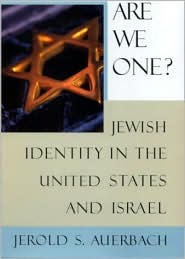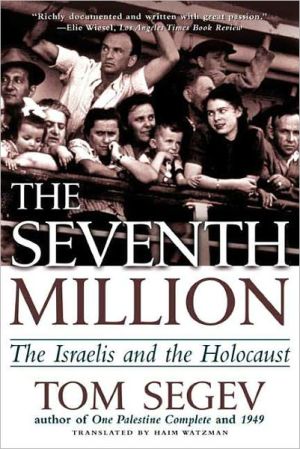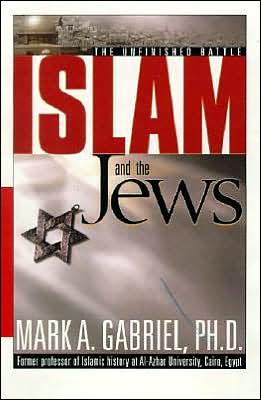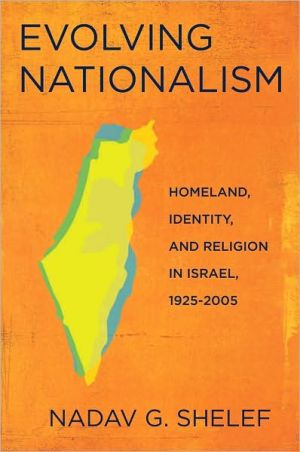Are We One?: Jewish Identity in the United States and Israel
What binds together Jews of Israel and the United States? Amid the hope and frustration generated by the Middle East peace process, the meaning of Jewish statehood is more vigorously contested than ever before. A secular democratic Israel, responsive to Western liberal values, is prepared to make peace with the Palestinians by sacrificing its own historic homeland. But a covenantal Israel, which draws its Jewish identity from divine promise and the biblical narrative, refuses to surrender to...
Search in google:
Drawing on both historical analysis and personal experience as a "non-Jewish American Jew" in Israel, Auerbach (history, Wellesley U.) discusses the modern crisis of Diaspora loyalty, Zionism as Americanism, Zionism vs. Judaism, and other conflicts of those "in exile at home." Includes a bibliographical essay. Annotation © Book News, Inc., Portland, OR Library Journal Auerbach (history, Wellesley Coll.) derived the title of his book from the American Zionist movement's slogan, "We are One," in regard to U.S. support for the establishment of the state of Israel in 1948. He rigidly describes the dilemma of the contemporary American Jew as the tension between a comfortable life of accommodation to Western culture and the religious requirement to live in Israel and thereby fulfill God's promise to Abraham that he would have many children who would live in a God-given land. Such an observation, of course, is nothing new; the Hebrew scripture is full of warnings about cultural accommodation and ethnic assimilation. In more recent times, Joseph L. Blau, for instance, clearly outlined this dilemma in Judaism in America: From Curiosity to a Third Faith (Univ. of Chicago, 1998), especially in his chapter, "Zionism as a Religious Expression." As long as Jews had no land of their own and were forced to live in exile, the problem was not as pronounced as it is now that Israel exists as an independent state. Auerbach explores every aspect of this riddle for U.S. Jews and even goes so far as to claim that the source of the problem is the Jews' freedom of choice. He agonizes over the inability to find any major solutions to the problem. A thoughtful if not entirely successful book; recommended for academic libraries. James A. Overbeck, Atlanta-Fulton P.L., GA Copyright 2001 Cahners Business Information.
\ \ Chapter One\ \ \ In Exile\ at Home\ \ The\ Emancipation\ Dilemma\ \ \ \ The American people have demonstrated an extraordinary ability to escape the past, create the present, imagine the future, and realize its promise. Confident, brash, and innovative, Americans have long asserted their uniqueness among all the peoples of the world. American Jews have enthusiastically embraced these expectations and fully realized them. Yet try as Jews may to emphasize how American they are, they also fall within the long shadow of Jewish Diaspora history, which still asserts its claims, often in unexpected ways. If any ancient prophecy has been fulfilled in our time, it is that of Jeremiah, the prophet of Diaspora survival.\ After the Babylonian conquest in 597 B.C.E., Jeremiah provided a remarkably prescient prescription for the renewal of Jewish life in the Diaspora. In a letter that still occasionally resonates for American Jews, the prophet conveyed his understanding of God's instructions to the exiled community:\ \ \ Build houses, and dwell in them; and plant gardens, and eat the fruit of them; Take wives, and beget sons and daughters ... that you may be increased there, and not diminished. And seek the peace of the city into which I have caused you to be carried away captives, and pray to the Lord for it: for in its peace shall you have peace. (Jer. 29:5-8)\ \ \ Rejecting any form ofactive resistance to conquest and dispersion, Jeremiah urged his people, abruptly wrenched from their homeland, to accept the normality of exile. Demanding accommodation to Babylon, he advised them to pray for the welfare of their foreign rulers. Jeremiah's advice was, and remains, entirely sensible. How else, after all, were Jews to survive in exile? But it should also be noted that his plea for docile accommodation to heathen rule, however pragmatic, marked a sharp departure from the biblical norm, which certainly did not counsel placid accommodation to foreign domination.\ Nor was that all. In one of his memorable parables, Jeremiah actually praised the exiled Babylonian captives as "good figs" for remaining loyal to God. But he castigated the remnant that remained behind in Jerusalem as "bad figs," evil-doers whose transgressions were "a horror." Those Judeans who still lived in the promised land, he warned, would intermingle and intermarry with their idolatrous neighbors. Geography alone, Jeremiah implied, offered no assurance of Jewish integrity or continuity.\ Was Jeremiah, as some Israelis have claimed, a despicable traitor, who placidly accepted defeat and exile? His counsel of capitulation to pagan rulers may, after all, have subverted the resolve of his people to resist foreign domination. Was there any religious obligation, the renowned biblical scholar Yehezkel Kaufmann inquired caustically, to surrender Jerusalem and the Temple "to a heathen king"? Jeremiah may have paid dearly for his prophecy of doom—he was despised, denounced, and cast into a slimy pit by his own people. But that hardly compensated, Kaufmann noted, for "the gravity of his offenses," which all but constituted treason.\ Or was Jeremiah, as Diaspora Jews have long insisted, the prophet of Jewish survival? Certainly, Jeremiah accepted exile as a necessary, if temporary, condition of Jewish life. He shrewdly calculated the risk, at one extreme, of misguided zeal for national restoration and, at the other, of craven assimilation. His letter carefully balanced the competing claims on their allegiance that Jews confronted. Ingeniously, he transformed loyal citizenship in a foreign state into Jewish religious obligation. Indeed, so persuasive was his counsel that the rabbis subsequently reworked his legacy of accommodation into a model for post-exilic Jewish survival outside the Land of Israel.\ Jeremiah's vision of exile may have been more complex than either his Israeli detractors or Diaspora admirers—each with their own ideological axe to grind—have recognized. His letter addressed an urgent theological and existential problem for the new Diaspora community in Babylon. Had God accompanied Jews into exile, they surely wondered, or were they abandoned to their fate? Recording their uncertainty, the Babylonian psalmist poignantly wondered, "How shall we sing the Lord's song in a foreign land?" Indeed, could it be sung there at all?\ Jeremiah's letter was reassuring on precisely that point: even in a foreign land, the "Lord's song"—prayer—could still be heard. The homeland might be lost, but God had not abandoned the children of Israel. Sooner or later, the prophet promised, the exiles would return to their promised home. Indeed, Jeremiah tangibly displayed his faith in national redemption. During the bleakest moments of the Babylonian siege of Jerusalem, he had purchased a field in his nearby birthplace of Anatoth, delivering the deed with the ringing declaration that "houses and fields and vineyards shall be bought again in this land."\ The devastating shock of foreign conquest initiated a debate over the meaning of exile and home that has persisted, unresolved, throughout Jewish history. Then and ever since, Jews have disagreed among themselves over their geographical and spiritual destiny as a people. The Babylonian Talmud, compiled many centuries after the exile, asserted that "whoever lives in the land of Israel is as one who has a God ... and whoever does not live in the land has no God." And, according to the Mishnah, the Land of Israel is "holier than any other land" (a sentiment that would please even the most resolute atheist among modern secular Zionists).\ But Jeremiah, for one, might have disagreed with such a Zion-centered reading. So did other sages, whose dissents the Talmud recorded. Rabbi Judah affirmed the primacy of Babylon, declaring: "Whoever lives in Babylonia is as if he lives in the Land of Israel." Indeed, anyone who left Babylon to return to Israel transgressed a positive commandment, for the rabbis instructed their communities that God alone, not human effort, could terminate the exilic punishment of the Jewish people. This very principle would be asserted many centuries later when the Zionist movement elicited stiff rabbinical opposition to its call for national restoration by dint of human effort.\ With the Babylonian exile, Jewish life in dispersion began. Even when given the opportunity to return some seventy years later, relatively few members of the exiled community abandoned the comforts and pleasures of Babylon for Jerusalem. Diaspora communities also flourished in Egypt, in both Alexandria and Elephantine, where Jews adapted to the land of their ancient bondage. There was "a unique and rewarding polarity" in Jewish antiquity, historian Elias Bickennan has suggested, with Jerusalem and the Diaspora communities co-existing in creative tension. Then as now, Diaspora Jews adapted to their host cultures even as they faced Jerusalem in prayer and implored God to return them to their holy land.\ About one thing, at least, Jeremiah surely was prescient: Jews in the Land of Israel were not immune to the enticements of foreign cultures. When Ezra led the exiled community from Babylon back to Jerusalem, he discovered a shockingly "unclean" land. The transgressions of the Israelites were evident: they "have not separated themselves from the peoples of the lands, doing according to their abominations." The homeland was no assurance of fidelity; Israelites had intermarried with strangers and worshipped foreign idols.\ The problem of cultural assimilation, even among those who remained "at home," persisted. Centuries later, as the celebrated story of the Maccabees reminds us, Mattathias and his sons stood virtually alone in their rejection of King Antiochus `s command for idolatrous worship. Modern renditions of the Hanukkah story, both in Israel and the United States, tend to evade the troubling fact that the first target of Maccabean wrath was not a foreign occupier but an assimilated Jew. In their national homeland, as in their Diaspora homes, Jews found the enticements of Hellenistic civilization—the civilization of foreigners—quite irresistible.\ After the first-century Jewish uprising against Roman rule was suppressed, Jews were once again exiled from their homeland. With only a tiny remnant remaining behind in the Land of Israel, Jewish history began to unfold in the Diaspora. Yet the longing for Zion was preserved, even as any efforts to satisfy that longing by human endeavor were vigorously suppressed by rabbinical authorities.\ The creation of a religious culture that could survive the loss of the homeland was, by any measure, a stunning achievement. By spiritualizing the land, and encasing it in memory and yearning, the rabbis managed to contain the impulse to return to Zion within the bounds of prayer, ritual, and hope. Sovereignty was lost and the people were scattered, but Jews everywhere remained bound by Jewish law and sacred time. Zion was desolate, but the Jewish people dwelled securely within the portable homeland of Torah.\ Throughout the Diaspora, for nearly two millennia, Jews remained clearly recognizable, to themselves and to Gentiles, as Jews. Living together in enclosed communities, their lives, religiously and culturally, were distinct and separate. Jews might borrow extensively from their neighbors (as the architecture of synagogues and the design of ritual objects so vividly demonstrates), but integration, to say nothing of assimilation, was impossible. With few exceptions, Jews could hardly imagine it and, regardless, Gentiles would not permit it. Over time, Jews internalized Jeremiah's admonition to adjust their lives and prayers to Diaspora reality.\ It would be foolhardy to suggest that every Diaspora Jew, during more than two thousand years, practiced what Jeremiah preached. But his admonition was embedded in a fundamental and enduring principle of Jewish law—dina d'malkhuta dina (the law of the state is the law)—that reconciled civic and Jewish obligation. To this day, Jeremiah's letter is still cited favorably by American Jews as a recipe for Jewish survival.\ The internal coherence of Jewish life, and the communal insulation that sustained it, survived until the beginning of emancipation at the end of the eighteenth century. First in France, and then throughout Western Europe, Jews were encouraged to abandon their ghettos to exercise the rights and enjoy the opportunities of citizenship. Eagerly responding to this enticing invitation, they reformed Judaism into a diminished religious affiliation that would be unlikely to offend their Christian neighbors. The fateful emancipation bargain—national citizenship in return for Jewish assimilation—was the transforming event of modern Jewish history.\ The emancipation process, so elaborately choreographed in France, is fascinating to reconstruct. It began in 1791, when the French National Assembly recognized Jews, identified as "individuals of the Jewish persuasion," as citizens of France. But civic equality in France implicitly mandated Jewish renunciation—or, at the very least, a radical redefinition of Judaism that would all but obliterate the distinctive national identity and sense of Jewish peoplehood that was historically embedded in the core of Jewish life. Once Jews were invited to become French citizens, the foundation of Jewish communal autonomy crumbled. Personal choice, the measure of civic freedom in the modern West, replaced the rule of Jewish law as the final arbiter of Judaism.\ To newly emancipated French Jews, the benefits of the exchange vastly outweighed any discernible cost. As Berr Isaac Berr, a merchant from Nancy, exulted: "We are now, thanks to the Supreme Being, and to the sovereignty of the nation, not only Men and Citizens, but we are Frenchmen!" In gratitude, Berr implored his fellow Jews to relinquish any "narrow spirit, of Corporation and Congregation" that might still set them apart. To deserve the esteem and friendship of fellow citizens, for which every emancipated Jew yearned, "We must absolutely appear simply as individuals, as Frenchmen, guided only by a true patriotism."\ Yet doubts lingered about the Jews. Were they truly prepared, after so many centuries of isolation, to divest themselves of their irritating peculiarities? In 1806, a Jewish Assembly of Notables, whose gestures of Jewish renunciation were carefully arranged by Napoleon, was convened to respond to lingering questions about the ultimate loyalty of Jews to the state. Its answers would determine whether French Jews could indeed become "faithful subjects" of an enlightened modern state.\ The questions varied: were polygamy, intermarriage, divorce, and usury still governed by Jewish law? Would rabbis continue to exercise legal authority, judicial power, and police jurisdiction? Did Jews consider other Frenchmen "brethren or ... strangers"? What conduct did Jewish law mandate toward Gentiles? And, at the heart of Napoleon's concern: "Do the Jews born in France, and treated by the law as French citizens, consider France as their country? ... Are they bound to obey the laws, and to follow the directions of the civil code?" Their answers to these questions would determine their civic worthiness.\ The Jewish Notables dutifully responded. Comprising "enlightened men of the Jewish persuasion," the assembly (rather abjectly, it must be said) subjected itself to "the paternal goodness of His Majesty." Eager to assure Napoleon, their benevolent "Christian Prince," that rabbinical functions were limited "to preaching morality in the temples, blessing marriages, and pronouncing divorces," the deputies hastened to repudiate all vestiges of rabbinical legal authority, which for so long had preserved Jewish communal autonomy. "France is our country," the Notables affirmed; therefore, "all Frenchmen are our brethren." They recognized that Jews "must, above all, acknowledge and obey the laws of the prince," for "in every thing relating to civil or political interests, the law of the state is the supreme law."\ Even this unequivocal affirmation of loyalty did not fully satisfy Napoleon. In a master stroke, replete with historical irony, he convened a Sanhedrin in Paris to ratify the surrender of the Notables. In ancient Palestine, the Great Sanhedrin of the Jews had exercised supreme judicial authority. Now, in modern France, a Christian ruler convened the Sanhedrin to repudiate all vestiges of Jewish legal authority.\ The French Sanhedrin, lavishing fulsome praise on Napoleon as the instrument of divine will, readily complied. Eager for Jews "to be one with the great family of the State," it insisted that Judaism was fully compatible with the civil laws that governed society. "We are in no wise separated from the society of men," the Sanhedrin declared. Dividing Jewish law into "political" and "religious" categories, it dismissed the former as inapplicable "since Israel no longer forms a nation." Jewish sacred laws, it noted approvingly, "religiously enjoin on all obedience to the State in all matters civil and political."\ Napoleon had every reason to be satisfied. The "moral regeneration" of the Jews, implicit in emancipation, was complete. Jews were now free, as the Sanhedrin recognized, "to build, to sow, to reap, to cultivate all human knowledge." The process of emancipation would take more than a century to run its course, but the essential principles were already in place by 1807 when the French Sanhedrin, its work of Jewish renunciation accomplished, vanished into oblivion.\ With emancipation, Judaism was converted from an encompassing way of life, framed by legal obligation, into a spiritualized (and increasingly marginalized) "religion." Duly reformed, it bore more than a slight resemblance to Christianity. With the dismantling of Jewish legal obligation, rabbis, traditionally the legal arbiters of Judaism, were now expected to do little more than preach morality in their temples and minister to their congregants, whose civic loyalty was channeled exclusively and passionately to the state.\ The nineteenth-century era of personal freedom, which proved sufficiently expansive to include the freedom from Judaism, had dawned for Western Jews. Yet as avidly as French citizens of the Mosaic persuasion pursued their journey from emancipation to assimilation, they still remained Jews—potentially disloyal aliens who, in the eyes of others, were forever suspect. As Captain Alfred Dreyfus discovered toward the end of the century, even passionate patriotic devotion might not suffice. With cries of Dreyfus's "treason" resounding through Paris in 1894, a thoroughly assimilated Viennese Jew such as Theodor Herzl could still feel vulnerable. Shocked by the anti-Semitic frenzy over Dreyfus, Herzl prepared his bold and desperate call for Jewish statehood.\ But why a Jewish state, and why then? After all, as Shlomo Avineri has noted, Jewish history was "a chronicle of discrimination at the hands of Christians and Moslems alike." What made Jews react to nineteenth-century persecution "by turning toward Zion"? To be sure, Jews had always remembered Jerusalem and prayed for their return. Yet only toward the end of the nineteenth century was this longing finally translated into political activism and resurgent nationalism. Why did an abiding religious yearning suddenly become such "a potent force for action" in the realm of politics?\ Why? Because Zionism alone offered to bridge the widening abyss between traditional Judaism and modern national identity. Rejecting Diaspora Judaism for its rigorous religious traditionalism, Zionism nonetheless rested its claim to a Jewish national homeland on biblical promises. Yet it also afforded Jews an opportunity to remain Jewish by defining themselves in national, not religious, terms.\ As deeply embedded in Jewish religious consciousness as the dream of returning to Zion surely was, political Zionism floated on the modern currents of secularism, liberalism, and nationalism. Zionism was a thoroughly secular yet undeniably Jewish answer to the Jewish Question—the identity and destiny of Jews in modern society. It was hardly coincidental that the boldest Zionist theoreticians—from Hess and Pinsker through Herzl and beyond—all plundered Western ideology for their assorted nationalist programs. Jewish identity, after emancipation, had become malleable, contingent, a matter of personal choice and political preference. Once Jews entered European society as civic equals, there were abundant possibilities. Why not Zionism?\ Consider Leo Pinsker, the assimilated doctor from Odessa. Like Herzl, whose Zionist argument he anticipated, Pinsker was a disillusioned emancipated Jew. Stunned by ferocious anti-Semitic pogroms after the assassination of the Czar in 1881 (as Herzl would be shocked fifteen years later by the Dreyfus case), Pinsker felt compelled (as Herzl did not) to reappraise the benevolent promise of emancipation. In an impassioned plea to Russian Jews, he insisted that "the eternal problem presented by the Jewish question ... remains unresolved."\ After nearly a century of emancipation, Pinsker wrote bitterly, the Jew remains "everywhere a guest, and nowhere at home." So adaptable were Jews to foreign, even hostile, cultures, that they had all but divested themselves of their own distinctiveness as a people. The price of their new freedom, he concluded sadly, was Jewish self-renunciation.\ Pinsker described the alluring promise of civic equality as merely "a rich gift, splendid alms," extended by Christians. (And, as European Jews would ultimately discover to their horror, it was a gift all too easily rescinded.) But whether Jews were "persecuted, tolerated, protected, [or] emancipated" mattered less than the "degrading dependence of the eternally alien Jew upon the non-Jew." Pinsker despaired of efforts to integrate Jews into society-even in a society based upon liberty and equality. Only as "a nation among nations" would the Jewish people finally rehabilitate itself, "in our own eyes and in the eyes of the world." Modern Jews "wish to live like other men," Pinsker wrote, "and be a nation like the others."\ "We must first of all desire to help ourselves," Pinsker insisted. Auto-emancipation—"the creation of a Jewish nationality"—was the answer. The self-respect of Jews required a home of their own (whose geographical location mattered as little to Pinsker as it would to Herzl). "Help yourselves," he implored Jews, "and God will help you!" Yet precisely here, even at his most daring, Pinsker remained bound by emancipation premises. Jews could only free themselves, this radical Jewish thinker insisted, by emulating everyone else.\ It remained for Herzl to devise the most compelling Zionist blend of national self-assertion and Jewish assimilation. Zionism did not come easily to this cultured Viennese journalist, who only recently had felt trapped as a Jew, "condemned to an identity he could neither assume nor reject." For his son's sake, he had confessed just after Christmas in 1892, he would "rather convert today than tomorrow.... But I cannot do it." (Herzl, for a time, even nurtured the bizarre fantasy of the mass conversion of the Jews.) Yet just a few years later, Herzl became the Zionist messiah, the savior of the Jewish people. His unequivocal answer to the vexing Jewish Question was Jewish nationalism. But nationalism, Herzl insisted, was only to hasten Jewish normalization. About Jewish distinctiveness, after all, Herzl was abysmally ignorant.\ Herzl's response, like Pinsker's, suggests that from the moment of its articulation, Zionism itself was trapped in the emancipation dilemma: Jewish "freedom" meant assimilation. For all the power of his assertion that Jews were one people, needing a state of their own, Herzl's Zionist ideas were far more deeply rooted in Western than in Jewish sources. He fantasized an "aristocratic republic," modeled upon Switzerland, which would become an "outpost of civilization as opposed to barbarism" in the Middle East. He wanted nothing less than Vienna-on-the-Mediterranean, where emancipated Jews could finally live normal lives like everyone else.\ The virulence of French anti-Semitism had convinced Herzl that the Jewish problem could only be solved by Jewish statehood. His central, compelling insight about Jews was that "we are a people—one people." His diagnosis was unerring: "We have sincerely tried everywhere to merge with the national communities in which we live, seeking only to preserve the faith of our fathers. It is not permitted us." His stunning achievement was to propel Zionism to the center of the debate over Jewish identity in the modern era, and even beyond that, into the arena of international politics—where it has remained ever since.\ Modern anti-Semitism, Herzl concluded, "is an outgrowth of the emancipation of the Jews." It would not abate; any expectation of human perfectibility, he warned, was "sentimental drivel." Yet assimilation was impossible: "The surrounding peoples ... will not let us be. After brief periods of toleration, their hostility erupts again and again." Therefore, Herzl's "quite simple," yet audacious, plan: "Let sovereignty be granted us over a portion of the globe adequate to meet our rightful national requirements; we will attend to the rest." Only in their own state, paradoxically, would Jews enjoy the freedom to assimilate.\ Herzl's Zionist dream, explicated in The Jewish State and, several years later, in Altneuland, was conspicuous for its Jewish barrenness. Herzl cited Jewish history as a burden from which emancipated Jews must finally escape; his occasional Jewish allusions invariably were dismissive. "We do not mean to found a theocracy, but a tolerant modern civil state," he wrote. Therefore, "our clergy" will not have "even the slightest chance to assert their whims. We shall confine them to their temples," precisely as Napoleon had demanded.\ In Herzl's multilingual Jewish state, "every man can preserve the language in which his thoughts are at home." ("Who among us," Herzl wondered, "knows enough Hebrew to ask for a train ticket?") But Yiddish, the "stunted and twisted jargon" of Eastern European Jews, should be eradicated. It symbolized the ghetto from which Jews must escape to a cosmopolitan homeland of their own. Its location hardly mattered. As between Argentina and Palestine, Herzl was indifferent, prepared to take "what is given us and what is selected by Jewish public opinion."\ Herzl's expanded vision of the Zionist future, described in Altneuland, was a utopian commonwealth where emancipated Jews, all but indistinguishable from Western European Christians, lived harmoniously with grateful Arabs who appreciated their civilizing virtues. Quite evidently, his source of inspiration for Jewish nationalism was not Jewish history but the enlightened West, with its "ideas which are the common stock of the whole civilized world." If modern anti-Semitism was an outgrowth of emancipation, as Herzl insisted, then so too was Herzl's Zionist response.\ Herzl's genius was to devise a way to secularize Jewish yearning for national restoration. Even as Zionism absorbed Jewish symbols and myths, he asserted, it must remain recognizably European. The virtues of Jewish statehood, for Herzl, were expressed in the modern secular language of the Enlightenment: "justice, truth, liberty, progress, humanity, and beauty."\ Herzl's personal visage exemplified the duality of Zionism, in which the ancient yearning of Jews was expressed in modern Western terms. His dark beard evoked images of a traditional Jew, even as his elegant sartorial style, with top hat and white gloves, identified him as a respectable Viennese gentleman. Recasting religious yearning in secular form, Herzl appealed to godless Jews in Eastern Europe who were desperately searching for an escape route to Western freedom.\ Because Zionism has been ratified by history, at least until recently when so many Israelis have wearied of its burdens, it is seldom recalled how furiously Herzl's plan was denounced by anti-Zionists and Zionists alike. Responding to the call for a Zionist Congress, the German "Protestrabbiner" (Herzl's derisive term for his rabbinical opponents) issued a sharp disclaimer. In a most incongruous alliance, seldom repeated, Reform and Orthodox rabbis converged in their hostility to secular nationalism. "Religion and Patriotism," the protest rabbis declared, obligated "all who have the welfare of Judaism at heart" to resist the siren song of Zionism.\ Reformers reasoned from emancipation premises to the inevitable conclusion that "Judaism obliges its followers to serve the country to which they belong with the utmost devotion." Jewish nationalism, according to the prominent American Reform rabbi Isaac Mayer Wise, was nothing but "a momentary inebriation of morbid minds." Jews already stood on "freedom's holy soil" in the United States, another Reform leader claimed. Judaism must remain a religion only,\ (Continues...)
Introduction11In Exile at Home: The Emancipation Dilemma272Zionism as Americanism513The Crisis of Diaspora Loyalty814Zionism versus Judaism1135The Return to the Biblical Homeland1416The Zionist War against the Jews1677Altneuland Revisited: A Journey to Palisdan203Acknowledgments221Bibliographical Essay225Index237
\ Library JournalAuerbach (history, Wellesley Coll.) derived the title of his book from the American Zionist movement's slogan, "We are One," in regard to U.S. support for the establishment of the state of Israel in 1948. He rigidly describes the dilemma of the contemporary American Jew as the tension between a comfortable life of accommodation to Western culture and the religious requirement to live in Israel and thereby fulfill God's promise to Abraham that he would have many children who would live in a God-given land. Such an observation, of course, is nothing new; the Hebrew scripture is full of warnings about cultural accommodation and ethnic assimilation. In more recent times, Joseph L. Blau, for instance, clearly outlined this dilemma in Judaism in America: From Curiosity to a Third Faith (Univ. of Chicago, 1998), especially in his chapter, "Zionism as a Religious Expression." As long as Jews had no land of their own and were forced to live in exile, the problem was not as pronounced as it is now that Israel exists as an independent state. Auerbach explores every aspect of this riddle for U.S. Jews and even goes so far as to claim that the source of the problem is the Jews' freedom of choice. He agonizes over the inability to find any major solutions to the problem. A thoughtful if not entirely successful book; recommended for academic libraries. James A. Overbeck, Atlanta-Fulton P.L., GA Copyright 2001 Cahners Business Information.\ \








